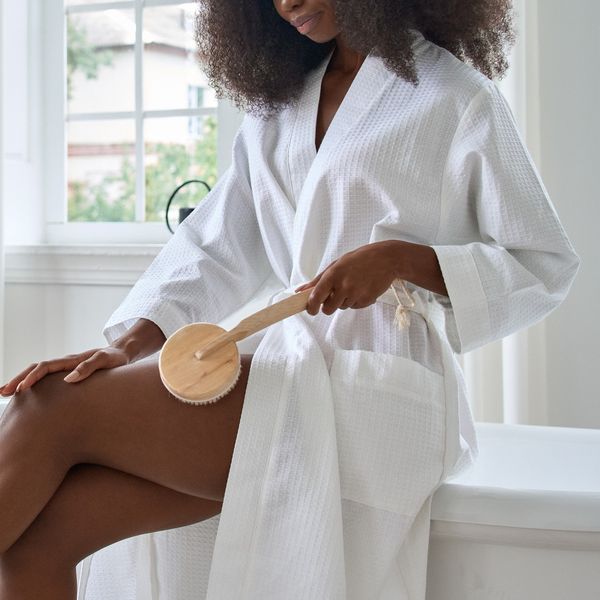
What To Know Before You Go Vegetarian
My relationship with meat is complicated and I haven't quite been able to go full vegan just yet. But considering the obvious health benefits, I want to eventually get there. My first step is to start as a vegetarian. And while, for me, it's not as drastic as going all the way vegan, it's definitely more than a simple notion and takes so much preparation. I've been able to hang in there for a little more than a month.
Nevertheless, I found a few tips along the way that would have been great to know beforehand. From getting familiar with healthy meat alternatives to steering clear of unhealthy choices, there are a couple of things to do and consider before you take the plunge.
Stock Up On Protein
I definitely should have looked at healthy protein alternatives before I kicked off this meatless lifestyle. I mean, I didn't go in completely blind, and at the very least did a little research, but this was clearly a factor that I overlooked. We all know that other than its juicy texture and mouth-watering flavor, one of the main benefits of meat is protein. So when you axe it from your diet, you run the risk of your body lacking some of the most important nutrients such as protein.
Related: 9 Tips on How to Transition to a Vegan Diet
Fortunately for you and all of our fellow proud vegetarians and aspiring vegans, meat isn't the only food that has a hefty supply of protein in it. (Thank you Captain Obvious) Some of the more popular protein options are quinoa, peanut butter, almonds, Greek yogurt, spinach, and eggs. Other options that I've had to be a little more creative with are lentils, peas, and beans. Ezekiel bread, hummus, sun-dried tomatoes, and pumpkin seeds are other options that most people didn't know contained tons of protein.
There are plenty of meatless options that give you just what you need to live this hard-knock vegetarian lifestyle. So you're in good hands.
Carbs Are Still Not A Go-To, Boo
Before you embark on being a vegetarian, think about cutting out unhealthy carbs and even desserts. This can help you have a long-lasting healthy regime that's more permanent than a trendy diet. I hope I'm not alone when I say I seriously thought that just because I wasn't eating meat, I could add a bunch of other unhealthy stuff to my diet, or at least keep filling up on the junk I was already eating. Please don't judge my life. Because it didn't take long for me to realize this was not the way to go.
Without meat, it's obvious that I wasn't feeling nearly as full after a meal, so I subconsciously filled up on snacks and potatoes. And I never really even ate chips like that before (shout out to white cheddar Cheez-Its for getting me through). My body didn't really feel a difference, but it didn't feel much better either. I had to learn quickly that instead of filling up on snacks, I needed to eat more vegetables, fruits, and healthy proteins. After all, that was the real reason for going vegetarian to begin with—so I could live a healthier lifestyle and not just put it in my Instagram bio.
Weight Loss Isn't Automatic
One of the positive factors of going vegetarian is (supposedly) weight loss. However, there's a catch or two for this major key.
For starters, it takes your body a while to even adjust and realize that you aren't eating meat. For me, it was a few weeks. If I had known the pounds wouldn't start shedding after day one, two, three, or even seven, I would have at least been a little more patient with myself and not expected to see immediate results. It probably didn't help that I was embracing those infamous carbs on another level too. Another factor is exercise.
Yes, going without meat is a healthy choice, especially for those who have made the change after seeing documentaries like What The Health and Food, Inc. But as difficult as it is, it's not the only change that's needed in order for you to have a healthy lifestyle overall. I actually stopped doing my daily workout when I cut meat from my diet because I really didn't think I needed it anymore.
At the same time, I was afraid I would start gaining too much muscle. After the first few weeks of not seeing a change, I started back on my workout. And to be honest, it felt really good and was the change I was looking for.
Remember Everybody Is Different & Every Body Is Different
Remy Ma's health journey is major #GOALS for me, but let's be real, I might not ever get those results. Just because someone is a size 6 and happens to be a vegetarian, doesn't mean that's going to be all of our stories. It could become that eventually, but if not, we have to be happy with what we are and remember that the ultimate #GOAL is to be healthy.
Looking at someone else's results is a huge no-no when you start out on this journey.
To begin with, it's super likely and pretty much inevitable that your body is going to respond to your new vegetarian lifestyle completely differently than how your friend's body responds to hers. And if looking at someone else's results makes you feel down about yourself or that there's no way you're doing it right, please stop. The main key is to do what's best for you and your body and make necessary changes however you see fit.
If you need to add fish or chicken every so often, go for it, but do it with a plan. Our bodies aren't cookie-cutter, and neither is this process. But knowing what's best for you and sticking with your own journey will get you the results you need.
Featured image by Shutterstock
- Thinking of Going Vegetarian? 6 Ways to Get There | Reader's Digest ›
- Vegetarian Society - Go Veggie ›
- Becoming a vegetarian - Harvard Health ›
- How to Become a Vegetarian, the Easy Way : zen habits ›
- What to Know Before You Go Vegetarian | Everyday Health ›
- 10 things you should know before going veggie | BBC Good Food ›
- The Most Laid-Back Guide to Going Vegetarian You'll Ever Read ›
- Everything You Need to Know About Going Vegetarian — Explained ›
- 22 Things To Know Before You Decide To Stop Eating Meat ›
- The Beginner's Guide To Going Vegetarian Without Getting Sick ... ›
Charmaine Patterson is a journalist, lifestyle blogger, and a lover of all things pop culture. While she has much experience in covering top entertainment news stories, she aims to share her everyday life experiences, old and new, with other women who can relate, laugh, and love along with her. Follow Char on Twitter @charjpatterson, Instagram @charpatterson, and keep up with her journey at CharJPatterson.com .
This article is sponsored by Hulu.
UnPrisonedhas returned for its highly anticipated second season, delving deeper into the complex dynamics of the Alexander family.
The series premiere comes a year after its debut season garnered rave reviews from fans and critics and earned record-breaking ratings for Hulu's Onyx Collective brand. UnPrisoned's success can be attributed to its raw, relatable themes and comedic appeal.
Inspired by creator Tracy McMillan's life, the show follows Paige (Kerry Washington), a therapist and single mother whose life takes an unexpected turn when her father, Edwin (Delroy Lindo) --who was released from prison-- moves in with her and her teenage son, Finn (Faly Rakotohavana).
Throughout UnPrisoned's first season, viewers witnessed how Edwin's incarceration deeply affected Paige's life and relationships. In the series, Paige unpacks her trauma through interactions with her inner child and her online followers. Meanwhile, Edwin is overcoming specific struggles with his own past that led to his life of crime, including a dysfunctional upbringing and his mother's arrest. As the Alexanders attempt to reconcile, new challenges arise.
This new season promises to further explore their unconventional family dynamic. Here are several compelling reasons why season two of UnPrisoned should be on everyone's watchlist.
The Alexander Family Life Is Still In Shambles
UnPrisoned's second season resumes where the series left off, with Paige grappling with the fallout from her troubled therapy practice and Edwin navigating life independently after moving out. Meanwhile, Finn faces his own challenges. The teenager is battling anxiety and seeking information about his father—a topic Paige avoids discussing.
The Alexander Family Are Attending Therapy To Resolve Their Underlying Issues
Amid the chaos in their lives, the Alexander family decides to mend their bond by confronting their past traumas. They seek professional help and attend therapy sessions with a “family radical healing coach,” played by John Stamos, a new cast member. This collective effort aims to unravel the complexities of their shared history and strengthen their relationships.
The process of unraveling each character's internal conflicts and their potential impact on future relationships may clash with Paige's textbook therapy approach. While Paige is used to being in the therapist's seat in both career and family, this forces her into the unfamiliar role of a patient during therapy sessions. This shift would compel her to look in the mirror and try a radically different approach.
The Alexander Family Learned A Big Lesson During A Therapy Session
In therapy, the Alexanders are tasked with addressing their individual traumas to salvage their remaining relationships. One of the family therapist’s eccentric suggestions was an exercise involving a family wrestling match. During this session, Paige faces tough questions about her refusal to share information about Finn's father.
While it's unclear whether this scene is reality or fantasy, the image of the family duking it out in the ring certainly makes for hilarious yet compelling television.
Paige Tries Dating Again Following Failed Relationships
Amid her life's chaos, Paige decides to step back into the dating field. However, her many attempts have left her with mixed results. The dating apps have turned out to be a fail, and an outing with her ex Mal (Marque Richardson), who is also her father's parole officer, doesn’t go quite as expected after he brings an unexpected guest – his new girlfriend.
The situation takes an awkward turn when Mal's new partner learns why the former couple split, partly due to Paige's self-sabotage.
UnPrisoned Is A Perfect Balance Of Comedy And Drama
As a dramedy, UnPrisoned takes a comedic approach to its heavy subjects. The show takes us on a ride with Paige's dating misadventures and navigating a friendship with her ex.
Other lighthearted moments include Edwin's attempts at CPR based on online videos and, of course, the antics of the Alexander family's unconventional new healing coach.
The second season of UnPrisoned is now available on Hulu.
UnPrisoned | Season 2 Trailer | Hulu
Feature image courtesy
Blair Underwood Initially Turned Down 'Sex And The City' Because 'It Was About How Samantha Was Fascinated By Dating A Black Man’
Actor and heartthrob Blair Underwood is opening up about why he turned down Sex and the City the first time he was offered a role. Many fans of the HBO series may recall Blair's time on the show in which his character was dating Miranda (Cynthia Nixon). However, he was previously offered another role where his character would date Samantha (Kim Cattrall).
During his interview with AV Club, the Set It Off star revealed that he was uncomfortable with the initial offer due to the character's fascination with him being a Black man.
“I actually did say ‘no’ the first time,” he said. “The first time they had offered the role, to be honest with you, it was about how Samantha was fascinated by dating a Black man and wanted to know if, uh, all of the rumors were true about our anatomy! And I said, ‘Listen, I’m honored, thank you, but I just don’t want to play a character based on race, on curiosity about a Black man.'”
But that didn't stop them from reaching out again. This time he was offered to play Dr. Robert Leeds, the love interest to Miranda and he decided to go for it. "So they were nice enough to call about a year later, and I said, 'Well, is it gonna be about race?' And they said, 'No, no, no, we’re not even gonna mention race!' And I think it really did only come up maybe once," he recalled.
"It did five episodes, and I think Samantha mentioned it once, saying something about 'a Black doctor' that Miranda was dating. And that’s really been a consistent thing in my career: not wanting to be boxed as 'the Black guy.'
"I’ve had that conversation with many producers along the way, and they were so great. They said, 'No, he’s just a doctor who Miranda meets in the elevator, and they have a nice little fling.' And it was amazing."
Blair has had a wide-ranging career playing everything from a lawyer on L.A. Law to playing Madame CJ Walker's husband on Self Made: Inspired by the Life of Madame CJ Walker. And during his interview, he revealed another role that he initially turned down, Set It Off. The movie, which is considered a classic in Black culture, stars Queen Latifah, Jada Pinkett Smith, Vivica A. Fox, and Kimberly Elise. Blair's character, Keith, played a banker and love interest to Jada's character, Stony.
He explained why he said no at first and eventually accepted the offer. "I had initially said “no” to that. Because I was playing this historic, iconic African-American historical figure in Jackie Robinson, and the time, y’know, there was Boyz N The Hood, and Menace II Society was out there, and I’d finished playing this noble Negro… [Laughs]," he said.
"And I’m reading the script, and there’s a scene where Jada Pinkett’s character—Jada Pinkett-Smith now—was going to sell her body so she could make some money to send her brother to college. And I remember, honestly, I threw the script across the room. I was, like, “I don’t want to do this. I want to do something uplifting for the Black culture and Black characters, and I don’t know if I want to see this.”
After a conversation with the movie's director F. Gary Gray and the actor's manager encouraging him to finish reading the script, Blair had a change of heart. What he first thought about the movie turned out to be totally different.
"So I finished the script, and I saw that the character they were asking me to play was really the love story in the midst of all of this turmoil of all of these characters, the four ladies: Queen Latifah, Vivica Fox, Kimberly Elise, and Jada," he explained.
"It was so well-written, it was such a great platform for them. And to be able to play the love story and the storyline that gave Jada’s character a leg up and a way out of this world, something to hope for, to wish for, someone to love her… I said, 'You know what? I’d like to be a part of that.'
"And I’m so glad I did, because that film resonates to this day. People all the time come up to me and say that they love that movie. So I’m glad that I did it."













